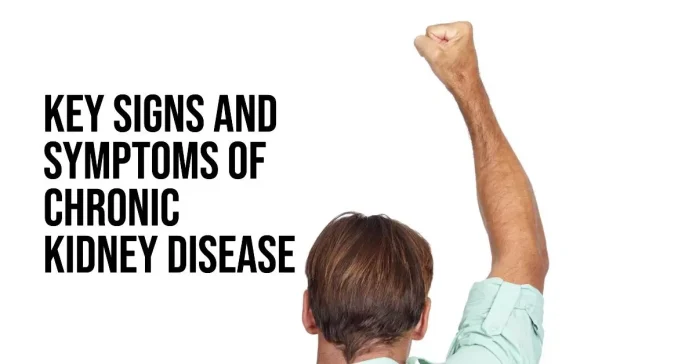Chronic Kidney Disease (CKD) is a serious health condition that often develops silently, with symptoms becoming apparent in later stages. Recognizing the signs and symptoms is essential for early detection and effective management. This guide explores various indicators of CKD, providing critical knowledge for proactive kidney health.
Eight Signs and Symptoms of Chronic Kidney Disease
Altered Urination Patterns
Pay close attention to changes in urination frequency, color, or consistency. An increase or decrease in the need to urinate, changes in urine color (particularly darkening), or alterations in consistency could indicate potential kidney issues.Swelling and Fluid Retention
CKD can lead to the retention of fluids in the body, resulting in swelling, particularly in the ankles, legs, or face. This swelling, known as edema, is a visible sign of kidney function impairment.Fatigue and Weakness
Persistently tired may be an early sign of CKD, even after adequate rest. The kidneys are crucial for producing erythropoietin, a hormone that triggers the production of red blood cells. When kidneys are compromised, fatigue and weakness can ensue due to decreased red blood cell production.Persistent Dry Itchy Skin
Diminished kidney function can lead to an imbalance of minerals and nutrients in the body, contributing to dry, itchy skin. Pay attention to changes in your skin’s texture and moisture levels.High Blood Pressure
CKD and high blood pressure often go hand in hand. The kidneys play a crucial role in regulating blood pressure, and when they are impaired, hypertension can develop. Regular monitoring of blood pressure is essential for those at risk.Loss of Appetite and Unexplained Weight Loss
A declining kidney function can lead to a loss of appetite and unintentional weight loss. If you notice a significant change in your eating habits and weight without apparent cause, seeking medical advice is essential.Blood in Urine
Never ignore hematuria, a concerning symptom indicating blood in the urine. It can mean various kidney issues and requires immediate medical attention.Difficulty Sleeping
Disturbed sleep patterns, particularly difficulty falling or staying asleep, may be linked to CKD. The kidneys’ role in regulating sleep-related hormones can be affected when kidney function declines.
Seeking Medical Attention
If you experience one or more of these critical signs and symptoms, it’s crucial to consult with a healthcare professional promptly. Early detection allows for timely intervention, potentially slowing the progression of CKD and improving overall kidney health.
Conclusion
Understanding the key signs and symptoms of Chronic Kidney Disease is vital in controlling your health. By staying vigilant and seeking prompt medical attention when needed, individuals can actively contribute to the early detection and effective management of CKD, promoting better kidney health and overall well-being.
Frequently Asked Questions (FAQs)
What is Chronic Kidney Disease (CKD)?
Chronic Kidney Disease is a long-term condition where the kidneys gradually lose their function over time, altering their ability to filter waste and excess fluids from the blood.
What are the Common Causes of CKD?
The most common causes of CKD include high blood pressure, diabetes, and certain kidney diseases. Other factors like smoking, obesity, and a family history of kidney disease can also contribute.
What Are the Early Signs of CKD?
Early signs of CKD may include changes in urination frequency, color, consistency, swelling in the ankles or face, fatigue, and blood in the urine.
How is CKD Diagnosed?
Diagnosing CKD involves blood tests to measure creatinine levels, urine tests, and imaging studies such as ultrasounds.
Can CKD Be Prevented?
Although some causes of CKD may be unavoidable, taking on a healthy lifestyle, managing conditions like diabetes and hypertension, maintaining hydration, and refraining from excessive use of certain medications can play a role in preventing it.
What Lifestyle Changes Can Help Manage CKD?
Lifestyle changes such as maintaining a balanced diet with limited salt and protein, staying physically active, managing blood pressure and diabetes, and avoiding smoking and excessive alcohol can help manage CKD.
Is CKD Reversible?
Although CKD typically involves irreversible kidney damage, early intervention, effective management, and lifestyle adjustments can decelerate its progression and enhance overall quality of life.
When Should I Consult a Doctor if I Suspect CKD?
Suppose you notice any signs of CKD or have risk factors such as diabetes or high blood pressure. In that case, it’s crucial to consult a healthcare professional promptly for proper evaluation and early intervention.










